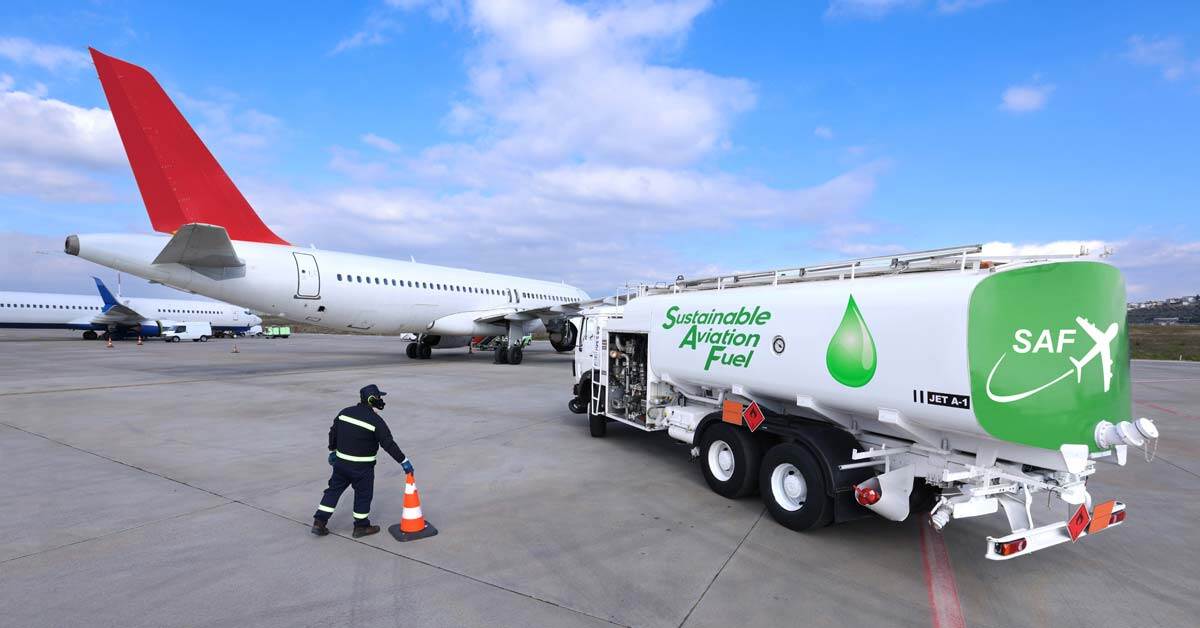4 min read
Did Virgin Atlantic Airways Lie About Its 100% SAF Flight?
 Harvey Greer
:
Aug 15, 2024 12:00:00 AM
Harvey Greer
:
Aug 15, 2024 12:00:00 AM

In late 2023, Virgin Atlantic Airways made waves in the renewables market by announcing a world-first transatlantic flight from London to New York using only sustainable aviation fuel. The company was praised for taking a historic step forward in the name of sustainability.
But recent news may suggest that the company was not completely honest about this achievement and the praise may not be fully warranted. What’s the real story here, and how should we properly understand terms such as “sustainable” in such a specific context?
Confusing or Misleading Statements About Virgin Atlantic’s SAF Flight?
According to the UK's Advertising Standards Authority (ASA), the issue at hand came thanks to Virgin's radio ad describing the flight from London to New York. The ad itself stated the following:
“On the 28th of November, Virgin Atlantic’s Flight 100 will take to the skies on our unique flight mission from London Heathrow to JFK to become the world’s first commercial airline to fly transatlantic on 100% sustainable aviation fuel. When they said it was too difficult, we said: challenge accepted. Virgin Atlantic Flight 100. See the world differently.”
(Source: Virgin Atlantic Airways)
The problem, as the ASA describes it, comes with the phrase "100% sustainable aviation fuel" used in the ad. Multiple complaints were made claiming that this wording was misleading at best—and intentionally deceptive at worst.
The ASA ruled that the claim violated the UK Code of Broadcast Advertising (BCAP) both in its misleading nature and its environmental claims.
Virgin Atlantic’s Explanation
The takeaway question here, as the title of this blog suggests, is about honesty. Was Virgin Atlantic’s flight really running on 100% sustainable aviation fuel?
The real answer? Yes and no—it depends on who you ask and how you define "sustainable."
Virgin Atlantic defended the language in the ad by clarifying the reasoning behind the specific terms used.
In December 2022, the company won a competition from the UK's Department for Transport, or DfT, to achieve the first net-zero transatlantic flight running off 100% SAF. The spirit of the competition is fairly clear: improve the technical aptitude of aviation and fuel to achieve this lofty SAF goal.
According to Virgin Atlantic, the phrasing used in the ad was intentional as it copied the exact wording that the DfT used in the competition. They assumed that from a consumer standpoint, understanding would involve two points:
- "100% sustainable aviation fuel" in this context means fuel that is made from sustainable sources and not coming from fossil fuel sources.
- This fuel type reduces but does not eliminate the release of CO2 when consumed.
This clarification appears to make a strong case for Virgin Atlantic. However, the problem comes from how SAF is sourced and the processes involved both in its production and its use.
As the UK Advertising Standards Authority explained in the above-referenced statement:
“[Virgin Atlantic] did not think listeners would understand the ad to mean that the fuel used for Flight 100 was derived from completely sustainable sources, did not generate CO2 or other emissions that had an adverse environmental impact during use... The ad did not claim that the fuel was 100% sustainable, nor did it give a misleading impression about the absolute or relative environmental nature, impact or credentials of sustainable aviation fuel (as compared to other aviation fuel). Rather, it factually described how the flight was powered exclusively by sustainable aviation fuel.”
(Source: UK Advertising Standards Authority)
Following the ASA’s reasoning, it seems obvious that Virgin Atlantic’s claim that the ad did not say that the fuel was 100% sustainable is ridiculous given the quote from the ad as “100% sustainable aviation fuel.” How could anyone comprehend this any other way?
On Equivocation and What ‘Sustainable’ Actually Means
When trying to unpack the problem, the fallacy of equivocation plays a big role in why things are so sticky. Equivocation occurs when one term is used that has multiple meanings. In this case, that word is “sustainable,” whether used as a standalone term or as part of the phrase ‘sustainable aviation fuel’.
Virgin Airline’s claim is that referencing SAF should not imply that the fuel is derived from 100% sustainable sources. In the ad they released, they said that they used 100% SAF, not that SAF is 100% sustainably derived.
The confusion comes in the double meaning of sustainable. How can sustainable aviation fuel not be anything other than 100% sustainable if it literally uses that exact word? It’s no wonder that the ASA determined that consumers could be confused by what the ad specifically meant.
But does this equivocation problem fall fully onto the shoulders of Virgin’s advertising team? As the company said to the ASA during the investigation, the use of "sustainable aviation fuel" reflected what they say is a universally-recognized reference to the fuel type. Governments, market members, producers, regulators, scholars and airlines alike all use the term.
SAF typically encompasses synthetic aviation fuels, too. These are fuels made using substances such as animal lipids, waste oils like UCO, and dextrose from corn starch.
Compared to other forms of SAF, synthetics may not have a fully sustainable production process. But the net carbon savings and the non-fossil fuel sourcing of synthetics still typically includes them under the SAF umbrella.
In this case, “sustainable” is used in two ways:
- In SAF referring to fuel that is produced without the use of fossil fuels.
- In direct reference to sustainability, which per Oxford’s definition is the ”avoidance of the depletion of natural resources in order to maintain an ecological balance.”
When understood both ways, it’s much clearer why there’s so much confusion.
Consequences for Virgin Atlantic
In the end, Virgin Atlantic faced nothing more than a slap on the wrist from the ASA with a reprimand to add more clarification in future ads. For the sake of clarity, this seems an appropriate demand.
Delineating SAF to mean fuel that is not sourced from fossil fuels would alleviate many of the problems highlighted by the ASA. But that should not imply that Virgin Atlantic is responsible for fully explicating the word “sustainable” and its public conception both in relation to sustainability and when connected to SAF.
The truth of the matter is that Virgin Atlantic’s flight from London to New York did indeed occur using SAF not derived from any fossil fuels. Whether or not we need to disambiguate the meaning of a word does not take away from what is a tremendous step toward a more... sustainable future.
Get Access to Vital SAF, Biofuel Pricing Indexes and Analysis
Prima CarbonZero from ResourceWise is an all-in-one biofuels and renewable feedstocks solution providing valuable renewable fuel pricing, deep market analysis, and so much more.
Our team of industry veterans and expert analysts offers pinpoint accuracy and market-reflective data backed by proven methodologies. With over 195 price points across market segments including SAF, bio-bunkering, UCO and biodiesel, we have a custom-fit subscription that works perfectly for your organizational needs.
Follow the link below to learn all about how our market intelligence can keep your business poised for success in this highly volatile industry.



![[Video] Molecules to Markets Episode 1: Chemical Markets Begin 2026 in a Supply-Driven, Margin-Sensitive Environment](https://www.resourcewise.com/hubfs/images-and-graphics/blog/chemicals/2026/weekly-video-series-molecules-to-markets/CHEM-Weekly-Video-Series-Molecules-to-Markets-Episode-1.png)
